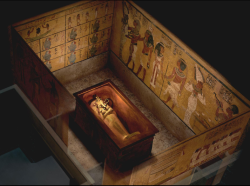
Published date
Tutankhamun was pharaoh during the Egyptian period of the New Kingdom. Descending from the eighteenth dynasty, he became pharaoh at the age of nine and his rule lasted for approximately ten years. Worshipped as a god, he had a devoted following, which is reflected in the temples that were built in his honour in as far away as Kawa and Faras in Nubia. Although an inscription signalled that Tutankhamun was the son of a king, his parentage is unknown. During his reign, Tutankhamun attempted to undo what the previous pharaoh had decreed. He lifted the ban that had been placed on deities and temples and restored privilege to the priesthood. He also tried to restore diplomatic relations with other kingdoms but was less successful in this regard.
The cause of Tutankhamun's death at the age of 19, is still unknown and there has been much speculation about his passing. Murder has been the main theory, and the suspects include his wife, his immediate successor, Ay, and his chariot driver. Despite these speculations, no evidence has been found that confirms the cause of his death. Tutankhamun was buried in a tomb that was relatively small given his status, but since his death might have occurred unexpectedly, he may have been buried in a tomb that was intended for someone of lesser importance.
Tutankhamun was relatively unknown to historians of ancient history until his tomb was discovered in the twentieth century. On 28 November 1922, a team of archaeologists announced that numerous gold treasures were found in Tutankhamun's tomb, which could all be used to provide greater insight into the history of Egypt during the New Kingdom. Many of these treasures are on display at the Cairo museum in Egypt.